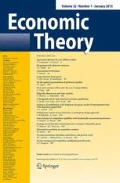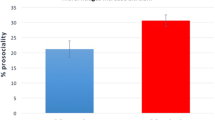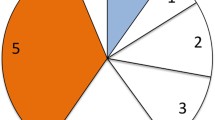Abstract
This paper explores whether generosity in experiments is truly evidence of concern for desirable social outcomes. We conduct an experiment using a binary version of the dictator game. We introduce several treatments in which subjects are able to leave the relationship between their actions and resulting outcomes uncertain, either to themselves or to another subject influenced by those actions, thus giving subjects the moral “wiggle room” to behave self-interestedly. We find significantly less generous behavior in these manipulations, relative to a baseline in which the relationship between actions and outcomes is transparent. We conclude that many subjects behave fairly in the baseline case mainly because they intrinsically dislike appearing unfair, either to themselves or others.
Similar content being viewed by others
References
Akerlof G., Kranton R. (2000): Economics and identity. Q. J. Econ. 115(3): 715–753
Andreoni J. (1990): Impure altruism and donations to public goods: a theory of warm glow giving. Econ J 100, 464–477
Andreoni J., Miller J. (2002): Giving according to GARP: an experimental test of the consistency of preferences for altruism. Econometrica 70, 737–753
Benabou, R., Tirole, J.: Incentives and prosocial behavior (2005) (unpublished manuscript)
Bicchieri C. (2006): The Grammar of Society: the Nature and Dynamics of Social Norms. Cambridge, MA Cambridge University Press
Blount S. (1995): When social outcomes aren’t fair: the effect of causal attributions on preferences. Organ Behav Hum Decis Process 63(2): 131–144
Bolton G.E., Katok E., Zwick R. (1998): Dictator game giving: rules of fairness versus acts of kindness. Int J Game Theory 27(2): 269–299
Bolton G.E., Ockenfels A. (2000): A theory of equity reciprocity and competition. Am Econ Rev 100, 166–193
Bolton G.E., Ockenfels A. (2005): A stress test of fairness measures in models of social utility. Econ Theory 25(4):957–982
Camerer C. (2003): Behavioral Game Theory: experiments on Strategic Interaction. Princeton, NJ Princeton University Press
Charness G., Rabin M. (2002): Understanding social preferences with simple tests. Q J Econ 117, 817–869
Cialdini R.B., Reno R.R., Kallgren C.A. (1990): A focus theory of normative conduct: recycling the concept of norms to reduce littering in public places. J Personal Soc Psychol 58, 1015–1026
Cooper D., Van Huyck J. (2003): Evidence on the equivalence of the strategic and extensive form representation of games. J Econ Theory 110(2), 290–308
Dana J., Cain D.M., Dawes R.M. (2006): What you don’t know won’t hurt me: costly (but quiet) exit in a dictator game. Organ Behav Hum Decis Process 100(2): 193–201
Darley J., Latane B. (1968): Bystander intervention in emergencies: diffusion of responsibility. J Personal Soc Psychol 8, 377–383
Dufwenberg M., Kirchsteiger G. (2004): A theory of sequential reciprocity. Games Econ Behav 47, 268–298
Engelmann D., Strobel M. (2004): Inequality aversion, efficiency, and maximin preferences in simple distribution experiments. Am Econ Rev 94, 857–869
Falk A., Fehr E., Fischbacher U. (2003): On the nature of fair behavior. Econ Inq 41(1): 20–26
Fehr E., Schmidt K.M. (1999): A theory of fairness, competition and cooperation. Q J Econ 114, 817–868
Hoffman E., McCabe K., Shachat K., Smith V. (1994): Preferences, property rights and anonymity in bargaining games. Games Econ Behav 7, 346–380
Kagel J., Kim C., Moser D. (1996): Fairness in ultimatum games with asymmetric information and asymmetric payoffs. Games Econ Behav 13, 100–110
Kahneman D., Knetsch J., Thaler R. (1986): Fairness and the assumptions of economics. J Bus 59, 285–300
Konow J. (2000): Fair shares: accountability and cognitive dissonance in allocation decisions. Am Econ Rev 90, 1072–1091
Krupka, E., Weber, R.A.: The focusing and informational influences of norms on pro-social behavior (2006) (unpublished manuscript)
Larson, T.: The use of strategic ignorance in dictator games when payoffs are not transparent: computer vs. paper testing techniques. Department of Economics Master’s Thesis, Emory University (2005)
Latane B., Nida S. (1981): Ten years of research on group size and helping. Psychol Bull 89(2): 308–324
Lazear, E., Malmendier, U., Weber, R.A.: Sorting opportunities in decisions involving fairness (2006) (unpublished manuscript)
Mitzkewitz M., Rosemarie N. (1993): Experimental results on ultimatum games with incomplete information. Int J Game Theory 22(2): 171–198
Munyan, L.: Patterns of information avoidance in binary choice dictator games. Working paper (2005)
Murnighan J.K., Oesch J.M., Pillutla M. (1999): Player types and self-impression management in dictator games: two experiments. Games Econ Behav 37, 388–414
Rabin M. (1993): Incorporating fairness into game theory and economics. Am Econ Rev 83, 1281–1302
Rabin, M.: Moral preferences, moral constraints, and self-serving biases (1995) (unpublished manuscript)
Roth A.E., Murnighan J.K. (1982): The role of information in bargaining: an experimental study. Econometrica 50(5): 1123–1142
Shang, J., Croson, R.: Field experiments in charitable contribution: the impact of social influence on the voluntary provision of public goods (2005) (unpublished manuscript)
Stewart, J.B.: Common sense: Enron defense wins the award for year’s worst. Wall Str J (East Edn) May 31, D.3 (2006)
Weber R.A., Camerer C.F. (2006): Behavioral’ experiments in economics. Exp Econ 9(3): 281–295
Author information
Authors and Affiliations
Corresponding author
Additional information
We thank Cristina Bicchieri; Iris Bohnet; Colin Camerer; Robyn Dawes; Ernst Fehr; George Loewenstein; John Patty; Charlie Plott; Matthew Rabin; seminar participants at Carnegie Mellon, Berkeley, Cornell, Emory, and Princeton; participants at the 2003 Public Choice, 2003 ESA, 2003 SJDM, and 2004 BDRM meetings; and anonymous referees for helpful comments and suggestions. We greatly appreciate the access to resources at the Pittsburgh Experimental Economics Laboratory (PEEL) at the University of Pittsburgh. This research was funded by a Carnegie Mellon Berkman Faculty Development Grant to Weber and a Russell Sage Behavioral Economics Small Grant to Dana.
Rights and permissions
About this article
Cite this article
Dana, J., Weber, R.A. & Kuang, J.X. Exploiting moral wiggle room: experiments demonstrating an illusory preference for fairness. Economic Theory 33, 67–80 (2007). https://doi.org/10.1007/s00199-006-0153-z
Received:
Accepted:
Published:
Issue Date:
DOI: https://doi.org/10.1007/s00199-006-0153-z




